Coordinación
Una coordinación sólida puede evitar vacíos y duplicaciones en las respuestas humanitarias, así como garantizar que los PTM complementen otros tipos de asistencia. Sin embargo, el informe del «Estado Global de los Programas de Transferencias Monetarias» de la CALP Network muestra que la coordinación de la asistencia en efectivo es vista como débil y ad hoc, y que esto está teniendo graves repercusiones operativas.
Los donantes, las ONG y los líderes de los grupos de trabajo de transferencias monetarias (GTM) han pedido claridad sobre tres temas principales relacionados con la coordinación de la asistencia en efectivo:
- Quién debe ser responsable de asegurar una coordinación eficaz de la asistencia en efectivo;
- Cuál es la función y el mandato de los grupos de trabajo de transferencias monetarias, incluso en relación con las transferencias monetarias multipropósito;
- Cómo se debe dotar de recursos a la coordinación de asistencia en efectivo.
Tenemos que basarnos urgentemente en lo que funciona y proporcionar claridad a nivel mundial sobre las preguntas arriba mencionadas, adaptándonos a los diferentes contextos. Hace mucho tiempo que se deberían haber tomado decisiones claras basadas en necesidades operativas y no en la política de las agencias.
Prioridades actuales
El objetivo de la CALP Network es contribuir a seguir progresando en este tema en tres niveles: apoyar a los grupos de trabajo de transferencias monetarias a nivel regional; contribuir a soluciones prácticas para la coordinación de la asistencia en efectivo a nivel mundial; y convocar una discusión basada en la evidencia sobre temas clave, destacando puntos de decisión críticos y oportunidades de progreso.
Contenido destacado

Cash Coordination Tip Sheet
Guidelines and Tools
This tip sheet sets out established best practice, key guidance and resources for all aspects of cash coordination, intended as a clear, accessible and action-oriented guide for those engaged in coordination of cash and voucher assistance (CVA) at the field level.

Introducing the Cash Coordination Tip Sheet
Webinar
The CALP Network has developed a tipsheet setting out established best practice and key guidance and resources for all aspects of cash coordination, intended as a clear, accessible and action-oriented guide for those engaged in coordination of cash and voucher assistance at the field level.

Cash Coordination: A proposal from members in MENA
Blog Post
Earlier this year the CALP Network undertook regional consultations to explore options for cash coordination. This blog lays out recommendations from participants from the Middle East and North Africa who sketched out what cash coordination, and coordination more broadly, could look like in future to support a more effective, efficient and accountable response.
Últimos recursos

Market Assessment and Analysis: Learner’s notes
Guidelines and Tools
This document presents the “Learner’s Notes” that accompany a distance learning course on Market Assessment and Analysis. The course illustrates how markets operate and how they relate to and affect food security and vulnerable households. It describes market components and how they function...

A Synthesis of Practical Lessons from Value Chain Projects in Conflict Affected Environments
Report
Over the last year, at the behest of USAID, 10 organizations captured results and lessons learned from projects that used value chain programming in conflict-affected environments. The goal of this paper is to extract larger lessons that emerge from these implementing organizations and the programs they...

The Use of Cash Grants in UNHCR Voluntary Repatriation Operations: Report of a lessons learned workshop
Report
On 4 April 2008, UNHCR’s Division of Operational Services and the Policy Development and Evaluation Service (PDES) co-sponsored a workshop on the use of cash grants in UNHCR repatriation operations. A total of 25 UNHCR staff members participated, together with six experts and researchers from Oxfam GB,...
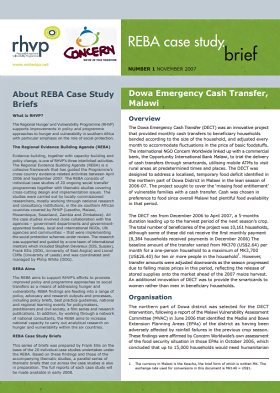
Dowa emergency cash transfer, Malawi
Case Study
This case study looks at the innovative Concern Worldwide project which provided monthly cash transfers to beneficiary households using smartcards utilising mobile ATMs to deliver the cash. The report examines the choice of programme delivery mechanism, the targeting of beneficiaries, coordination, cost...
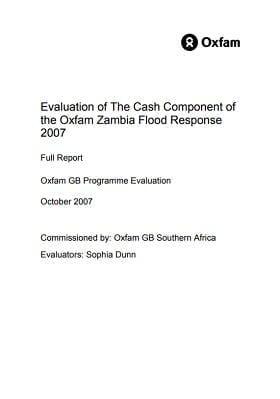
Evaluation of The Cash Component of the Oxfam Zambia Flood Response 2007
Report
Oxfam Zambia responded to the flooding in Western Province by providing unconditional cash grants to 2100 households over a four month period (May – August 2007) in two wards of Mongu District Ushaa and Lumbo. The grant was designed to prevent malnutrition and harmful levels of asset depletion and...
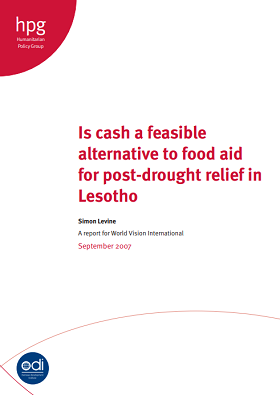
Is cash a feasible alternative to food aid for post-drought relief in Lesotho
Case Study
This report summarises the findings from a study undertaken to assess whether or not a cash based response by World Vision to the current drought in Lesotho would be an appropriate and feasible response. It looks at the potential problems which could affect the feasibility of cash interventions and...
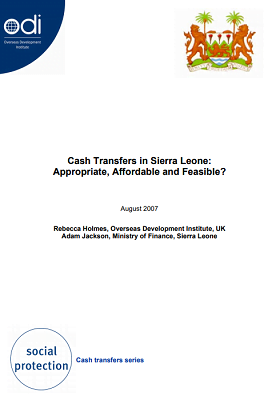
Cash transfers in Sierra Leone: Appropriate, affordable and feasible?
Case Study
This paper is one of a series of outputs from ODI’s research study (2006–09) “Cash Transfers and their Role in Social Protection”. The study aims to compare cash with other forms of transfers, identifying where cash transfers may be preferable, the preconditions for cash transfers to work well,...
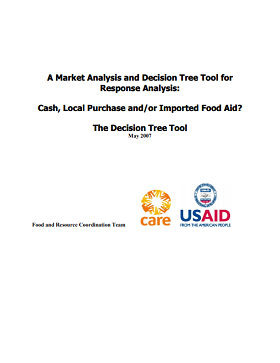
A Market Analysis and Decision Tree Tool for Response Analysis: Cash, Local Purchase and/or Imported Food Aid?
Report
This document provides the Decision Tree Tool, which is to be used for the analysis of response options in a food insecurity context – cash, local purchase or imported food aid (see MIFRA paper). The framework is kept simple for ease of communication with a sequence of specific questions divided into 2...
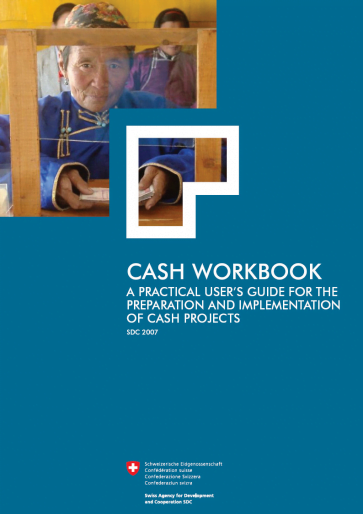
Cash Workbook: A Practical User’s Guide for the Preparation and Implementation of Cash Projects
Guidelines and Tools
This workbook is a tool that guides managers through the project cycle of managing a cash transfer programme including administrative and database setup, and project management systems and procedures.

The Use of Cash/Vouchers in Response to Vulnerability and Food Insecurity: Case study review and analysis
Report
This document summarizes the major characteristics and outcomes of 27 recent pilots, projects or programs worldwide that made use of cash and/or vouchers to provide benefits to people in need. The concluding section attempts to synthesize the commonalities and contrasts among those cases, as a first step...
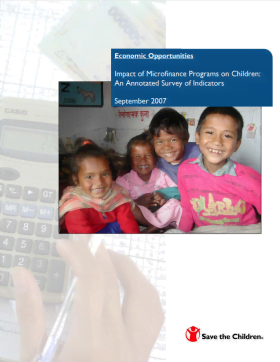
Impact of Microfinance Programs on Children: An annotated survey of indicators
Report
The purpose of this study is to ascertain what indicators have been used by multisectoral, child-focused non-governmental organizations (NGOs), microfinance practitioners and social performance researchers to assess processes that address children’s concerns in operations and the impact of microfinance...
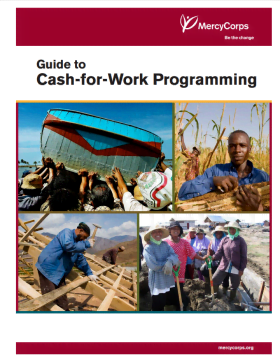
Guide to Cash-for-Work Programming
Guidelines and Tools
Cash-for-Work is a short-term intervention used by humanitarian assistance organizations to provide temporary employment in public projects (such as repairing roads, clearing debris or re-building infrastructure) to the most vulnerable segments of a population. The methodology is relatively new, but its...

Cash Workbook – A Practical User’s Guide for the Preparation and Implementation of Cash Projects
Report
Since 1999, the Humanitarian Aid Department of the Swiss Agency for Development and Cooperation (SDC), a division of the Federal Department of Foreign Affairs, has implemented a series of Cash Transfer Projects in different humanitarian contexts. Cash grants provided to more than 100,000 people in need...

Implementing cash-based interventions: A guideline for aid workers
Guidelines and Tools
This is a comprehensive guide to the theory and practice of cash-based interventions in the field, covering cash grants, vouchers, and labour-based interventions (cash for work). It also includes practical templates including examples of questionnaires, market surveys, beneficiary cards, voucher formats...

External Evaluation Report on the Cash for Repair and Reconstruction Project Sri Lanka
Report
The Indian Ocean tsunami caused huge loss of life, displacement and destruction in Sri Lanka. People’s immediate priorities were to find shelter, safety, meet basic needs and trace and mourn loved ones. The population affected took shelter with relatives and friends, in temples, mosques and public...
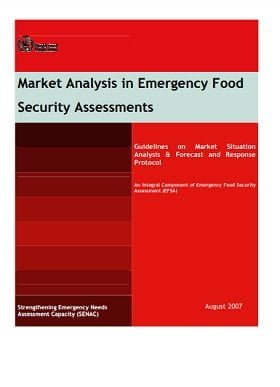
Market Analysis in Emergency Food Security Assessments
Guidelines and Tools
This document provides a generic overview of market analysis as an integral part of an emergency food security assessment. The main objective is to provide a basic understanding of markets, including how to gather market information, conduct a situation analysis, and
interpret the analysis to inform...

Market Analysis Tools in Rapid-Onset Emergencies: Phase one report
Report
This report was commissioned by Oxfam’s Emergency Food Security and Livelihood (EFSL) team as part of a larger exercise to develop a market analysis toolkit for rapid-onset emergency situations. The impetus for this arose from the recognition by Oxfam, other humanitarian agencies and donors that the...

Guidelines for cash transfer programming
Guidelines and Tools
A practical guide, including guidance sheets and a section on practical tools. Building on the broad range of cash experiences within the Movement and in the humanitarian sector, these guidelines provide practical, step-by-step support to the design and implementation of cash programmes.
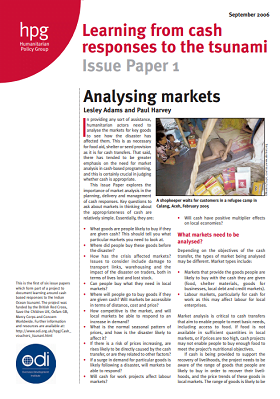
Learning from cash responses to the tsunami: Issue Paper 1: Analysing markets
Report
This is the first of six issue papers which form part of a project to document learning around cash-based responses to the Indian Ocean tsunami. The project was funded by the British Red Cross, Save the Children UK, Oxfam GB, Mercy Corps and Concern Worldwide. This 5-page Issue Paper explores the broad...
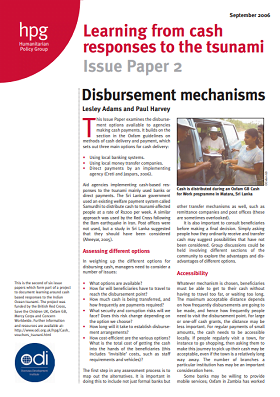
Learning from cash responses to the tsunami: Issue Paper 2: Disbursement mechanisms
Report
This is the second of six issue papers which form part of a project to document learning around cash-based responses to the Indian Ocean tsunami. The project was funded by the British Red Cross, Save the Children UK, Oxfam GB, Mercy Corps and Concern Worldwide. This 5-page Issue Paper examines the...